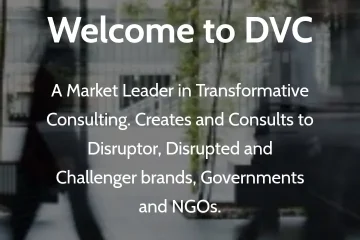At DVC Consultants we are often consulting to challenger brands and tech start-ups .As such we are regularly asked about what makes these brands and companies investable. Although not exhaustive ,from our experience over the years, we have compiled a summary.
We hope you find it helpful.
1. Provides Innovative Solutions: A start-ups’ ability to offer groundbreaking solutions to existing problems or needs sets it apart. Investors are attracted to companies that bring fresh and creative approaches to challenges in their respective industries.
2. Strong and Scalable Business Model:A well-structured and scalable business model is crucial for sustained growth. Investors seek startups that can efficiently adapt and expand their operations as they capture larger market shares without a proportional increase in costs.
3. Team Made up of Global Leaders in Their Field:Having a team with experienced leaders who have a track record of success adds credibility. Investors are more likely to invest in startups led by individuals with expertise and a proven ability to execute.
4. Clear Market Potential: Demonstrating a thorough understanding of the target market, its size, and the potential for growth is essential. Investors want to see that the startup addresses a real market need and has the potential to capture a significant share of that market.
5. Disrupts Existing Business Models: Disruption is often a key factor for success in the tech industry. Startups that challenge and innovate beyond traditional business models are often more appealing to investors who seek high-risk, high-reward opportunities.
6. Well-Defined Global Target Audience: Understanding and catering to a specific, well-defined target audience is crucial. Investors appreciate startups that have a clear understanding of their customer base and can effectively tailor their products or services to meet their needs.
7. Clear Path to Profitability: Investors want to see a realistic and achievable roadmap to profitability. Startups with a well-defined plan, backed by sound financial projections and a strategy to monetize their offerings, are more likely to attract investment.
8. Strong Potential for Long-Term Growth: Beyond short-term gains, investors are interested in start-up’s that have a sustainable competitive advantage and long-term growth potential. This could be through expanding product lines, entering new markets, or maintaining a strong market position.
In summary, a start- up becomes highly investable when it combines innovation, a robust business model, a talented team, a clear understanding of its market, disruptive capabilities, a well-defined target audience, profitability prospects, and a vision for sustained growth
In the context of technology start-ups, several specific elements contribute to their investability:
1. Cutting-Edge Technology: Tech start-ups often leverage advanced and cutting-edge technologies. Whether it’s artificial intelligence, blockchain, machine learning, or other emerging tech, having a technological edge can make a startup highly attractive to investors.
2. Scalability Through Technology: The scalability of a tech start-up is often tied to its technological infrastructure. Investors look for start-up’s that can seamlessly scale their operations with increased demand, without incurring proportionate increases in costs.
3. Innovation and Intellectual Property: The ability to innovate and develop intellectual property, such as patents or proprietary algorithms, can be a significant factor in attracting investment. This not only provides a competitive advantage but also establishes barriers to entry for potential competitors.
4. Data Analytics and Insights: Tech start-ups that effectively harness and analyse data to gain valuable insights into user behaviour, market trends, and operational efficiency are often more appealing to investors. Data-driven decision-making enhances the chances of success and growth.
5. User Experience and Design: In the tech industry, user experience (UX) and design play a crucial role. Investors value start-ups that prioritise creating user-friendly products or services with intuitive interfaces, as positive user experiences contribute to customer retention and satisfaction.
6. Adaptability and Agility: The tech landscape evolves rapidly, and successful start-ups demonstrate adaptability and agility. Investors seek companies that can pivot when necessary, stay ahead of technological trends, and capitalize on new opportunities.
7. Cybersecurity and Compliance: With the increasing importance of data security and privacy, investors closely examine a start-up’s approach to cybersecurity and regulatory compliance. A robust cybersecurity strategy not only protects the company and its users but also enhances investor confidence.
8. Integration of Ecosystems and Platforms :Tech start-up’s that can seamlessly integrate with existing technology ecosystems or platforms often have a broader reach. Investors may be more inclined to support startups that can collaborate effectively within larger technological frameworks.
9. Network Effects: Start-ups that can leverage network effects, where the value of the product or service increases as more users join, are particularly appealing. This creates a mo re defensible position in the market and fosters sustainable growth.
10. Remote and Decentralized Work Models: Especially relevant in the post-pandemic era, start-ups with efficient remote work models or decentralized structures can attract investment. Investors appreciate adaptability to changing work dynamics and the potential for cost savings.
In summary, technology plays a pivotal role in the invest ability of tech start-ups. Leveraging cutting-edge tech, scalability, innovation, data analytics, user experience, adaptability, cybersecurity, ecosystem integration, network effects, and modern work models contribute to making a tech start up highly attractive to investors.
DVC Consultants, is currently consulting to Agencio, to build A Global Brand Orchestration Platform that will deliver Generative AI technologies to companies worldwide.
About the author
DVC Consultants: Exploring Unknown Unknowns since 1995. Quentin Anderson is Executive Chairman, DVC Consultants, CEO and Co-Founder of BankTotal, and Co-Founder of the social media platform Mifamilias.com. He has decades of experience in advising companies, and for 18 years was a CEO of brand development companies in the WPP group.
q.anderson@dvcconsultants.com
Management Consultants
AI Enabling AI: A Comprehensive Examination of Kunavv.ai’s Innovative Approach
Tom Biegala on AI Enablers A quote from a Forbes Magazine article- There are nine AI startups that VCs wish founders would pitch them No 9 – Tom Biegala, of Bison Ventures Says “AI also Read more…




0 Comments